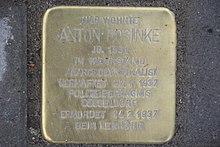Anton Rosinke
Anton Rosinke (born December 18, 1881 in West Prussia , † February 14, 1937 in Düsseldorf ) was a German anarcho-syndicalist . The trained blacksmith was one of the most active anarchists in the Rhineland. He was committed to the "Freie Erde" settlement in Düsseldorf-Eller, which was founded in 1921, and after the National Socialist " seizure of power " played a key role in building up the anarchist resistance network in the Rhineland . He was arrested in 1937 and died in police custody following physical abuse.
Life
Rosinke came to Düsseldorf-Gerresheim at a young age . According to the historians Andreas G. Graf and Dieter Nelles, the trained blacksmith Rosinke was one of the most active anarchists in the Rhineland. Even before the First World War , he was involved in the Anarchist Propaganda Association in Düsseldorf and the anarchist-oriented choral society Free Singers 04 in Gerresheim. From the beginning of the First World War until February 1915 he was taken into security custody and then briefly drafted into the military.
After the Kapp Putsch to Rosinke joined the Ruhr Red Army and took part in the Ruhr Uprising . In the Weimar Republic he was a militant within FAUD and FKAD . He actively supported the anarchist settlement "Freie Erde" in Düsseldorf-Eller, founded in 1921, which was based on the ideas of Gustav Landauer .
After the National Socialist "seizure of power", Rosinke tried to organize armed resistance in Düsseldorf and participated in the establishment of an illegal FAUD resistance network in Düsseldorf through Gerhard Lasarzick . First he produced leaflets and a newsletter together with Paul Hellberg, who ran a printing company. As the newsletter in Belgium was printed, to Rosinke and Lasarzick care of the distribution and the distribution of other illegal headings like Eat German fruit (1934, Tarntitel for the brochure "What we want to anarcho-syndicalists"). In 1934 Rosinke was briefly arrested.
With the outbreak of the Spanish Civil War , the anachro-syndicalist resistance concentrated on providing information about the situation in Spain, bringing volunteers across the border for the International Brigades and collecting money. After the Mönchengladbach group was broken up in November 1936 , over 100 anarcho-syndicalists were arrested in eleven cities on the Rhine in the following three months. On January 27, 1937, Rosinke was arrested for collecting solidarity funds for Republican Spain and tortured by the Secret State Police in the police headquarters . He died as a result of the abuse.
On July 7, 2017, a stumbling block for Anton Rosinke was laid at his last home at Friedrich-Engels-Strasse 14 (formerly Bennemannstrasse), in Düsseldorf-Vennhausen, Liberty estate.
literature
- Hans Bernd Ashauer-Jerzimbeck: The anarcho-syndicalist factory worker and blacksmith Anton Rosinke (1881-1937). On the 80th anniversary of his death from Gestapo torture. , in: Düsseldorfer Geschichtsverein (Ed.): Düsseldorfer Jahrbuch 2018 . Contributions to the history of the Lower Rhine, Volume 88, ISBN 978-3-8375-1989-1 .
- Helge Döhring: Anarcho-Syndicalism in Germany 1933–1945 . Butterfly Verlag, Stuttgart 2013, ISBN 3-89657-062-5 .
- Ulrich Klan, Dieter Nelles: “There's still a flame alive”. Rhenish anarcho-syndicalists in the Weimar Republic and under fascism. Nevertheless-Verlag, Grafenau-Döffingen 1986, ISBN 3-922209-72-6 .
- R. Theissen, P. Walter, J. Wilhelms: Anarcho-Syndicalist Resistance on the Rhine and Ruhr. Twelve Years Behind Barbed Wire: Original Documents. EMS-KOPP Verlag, Meppen 1980.
Web links
- Notes by Ernst Binder (Anton Rosinke's son-in-law), Düsseldorf-Eller, August 24, 1946, about the anarcho-syndicalist resistance on anarchismus.at.
Individual evidence
- ↑ a b c Rudolf Berner : The invisible front. Report on illegal work in Germany (1937). ed., annotated and supplemented by a study on resistance and exile by Andreas G. Graf and Dieter Nelles, 1st edition. Libertad-Verl., Berlin 1997, ISBN 392222623X , p. 20.
- ^ Gertrude Cepl-Kaufmann: Gustav Landauer in the Friedrichshagen decade and the reception of his community ideal after the 1st World War. In: Hanna Delf and Gert Mattenklott (eds.): Gustav Landauer in conversation. Symposium for the 125th birthday. Niemeyer, Tübingen 1997, ISBN 9783484651180 ( Conditio Judaica . 18), p. 267.
- ^ Hans Manfred Bock: Anarcho-Syndicalism in Germany. An interim balance . In: IWK 25 (1989), p. 375.
- ↑ FAU General Syndicate Düsseldorf: in Memoriam: Anton Rosinke , accessed on July 9, 2017.
| personal data | |
|---|---|
| SURNAME | Rosinke, Anton |
| BRIEF DESCRIPTION | German anarcho-syndicalist |
| DATE OF BIRTH | December 18, 1881 |
| PLACE OF BIRTH | West Prussia |
| DATE OF DEATH | February 14, 1937 |
| Place of death | Dusseldorf |
